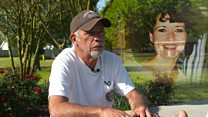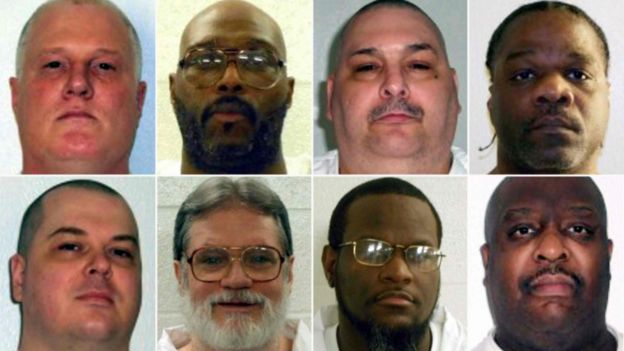BBC News
Arkansas has executed Ledell Lee in the US state's first use of the death penalty in 12 years.
It came after the US Supreme Court rejected a challenge arguing Arkansas was unfairly rushing several executions before its supply of a lethal injection drug expires at the end of April. On Thursday the state's Supreme Court overturned a ruling blocking the use of a different drug. Lee was convicted for murder and recently told the BBC he was innocent.
His third request to stay the execution was denied. He was pronounced dead at 23:56 local time on Thursday (04:56 GMT on Friday) at the state's death chamber in its Cummins Unit prison, a Department of Corrections spokesman said. His death warrant was due to expire at midnight.
Lee did not make a final statement. Instead of a last meal, he asked to receive communion, an official said. He had been on death row for more than 20 years after he was convicted of beating Debra Reese to death with a tyre iron in 1993.
Her family "had waited 24 years to see justice done", Arkansas Attorney General Deborah Rutledge said in a statement. "I pray this lawful execution helps bring closure for the Reese family," she said.
Lee told the BBC's Aleem Maqbool in a recent interview that he was innocent, and death row was like a "living nightmare".

Arkansas victim's husband: 'My wife suffered big time'
The state had initially planned to carry out eight executions in 11 days, before the 30 April expiration date of its supply of the drug, midazolam - used together in lethal injections with two other drugs.
The first three executions were cancelled due to various court rulings.
The other inmate due to die on Thursday has been given a stay to make time for advanced DNA testing that his lawyers say could prove his innocence.
Stacey Johnson was convicted of the murder of Carol Heath, who was beaten and had her throat slit in her flat in 1993.
Thursday saw a flurry of legal activity, with the new Supreme Court Justice Neil Gorsuch siding with conservatives in the 5-4 decision to reject the inmates' claim that the accelerated process amounted to "cruel and unusual punishment".
It followed Arkansas's Supreme Court's overturning of a ruling by a lower court that blocked the use of the drug vecuronium bromide.
The McKesson Corporation, which supplied the drug, had accused the Arkansas Department of Correction of failing to say it planned to use the drug for executions.
Like many US states, Arkansas has struggled to find the drugs it needs to carry out executions. Its last was in 2005.
What this means - Aleem Maqbool, BBC News
The frenetic filing of lawsuits and appeals in Arkansas has a profound impact on those awaiting execution, on their families and on the relatives of their victims.
The widower of one victim told me that if he had been told from the beginning that his wife's killer would be in prison for life without parole, he might have been able to move on.
But, he said, to have the prospect of the man's execution arise and disappear over the years means reliving the hurt of the murder itself, and that every stay of execution now feels like an insult to his wife.
What this highlights is how hard it has become for states to kill by lethal injection, with botched executions and drug companies saying they do not want their products associated with the practice.
What did all these men do?
 GETTY IMAGES
GETTY IMAGES
Bruce Ward - Strangled teenage shop clerk Rebecca Doss
Don Davis - Condemned for the execution-style killing of Jane Daniel as he burgled her home
Stacey Johnson - Murdered Carol Heath, who was beaten, strangled and had her throat slit
Ledell Lee - Bludgeoned Debra Reese to death with a tyre iron her husband had given her for protection
Jack Jones - Condemned for the rape and murder of accounts clerk Mary Phillips, and the nearly fatal beating of her 11-year-old daughter
Marcel Williams - Raped and murdered Stacey Erickson, after kidnapping her from a convenience store
Kenneth Williams - Murdered farmer Cecil Boren during an escape from prison where Williams had been incarcerated for murdering cheerleader Dominique Hurd
No comments:
Post a Comment